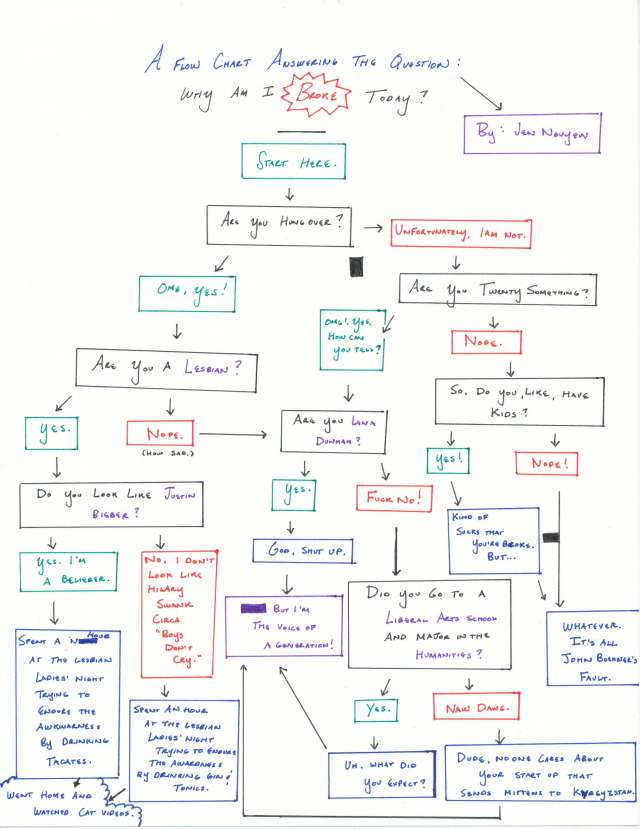Note: This is essay is part 2 of a 2 part series — a direct response to the Supreme Court’s first hearing on California’s Proposition 8. If you’d like to read the part 1, click here.
—
As a writer, this is my first public and explicit expression of my identity as a gay Vietnamese American woman – a woman who, since the beginning of her sexual consciousness, has been hopelessly attracted to other women. I have written candidly about other difficult issues, most notably about my parents and their tumultuous relationship with the Vietnam War.
As much as I have written about their experiences, I am an outsider to their war – a spectator who can craft a vicarious moment, but is capable of escaping to a memory free of combat violence and geographic exile. Yet, being gay is my own refuge-less war with myself, with (at times) my community, and with political sentiment. Perhaps this is why I find it easier to write about my identity from a distance:
The girl was born in southwest Houston, Texas, raised in a neighborhood of bodegas, Vietnamese supermarkets, and Indian restaurants. She liked basketball, birthday parties, school and, slowly and despairingly, one of her friends – a girl. In her longing, she spent many nights wondering why the stories in her head contrasted so greatly with what everyone had to say about the world. She constantly contemplated ways to fix herself.
The girl lived a quiet childhood – a lot of sadness, a lot of imagination, a thematic and overwhelming sense of confusion and melancholy. She passed the time by reading, writing, and imagining the lives other people. In adolescence, she fabricated an identity to hide in: feigned crushes, elaborate excuses, a façade of reserve to mask how scared she was of everything, especially herself. She started to develop a detachment from physical places because she always wanted to be somewhere else.
She did this for more than a decade until she suffocated in the very identity she had methodically constructed. One October weekend in her twenties, she took a bus to Brooklyn to see her sister. On a patio, peeling the wrapper off a bottled local brew, she could no longer handle feeling stifled by her lies and began to cry. For 20 minutes, she struggled to speak until quietly she stuttered, “I’m gay.”
She would say the same phrase in iteration. Once to one of her best friends who drove her in circles while she pled, “I have something to tell you. Please keep driving. Please keep driving.” Once in an anonymous letter of desperation to a philosophy professor. Once to her father only, this time, she didn’t cry – he did.
—
If there is anything that I can appreciate about the passage of time it is that, as I age, the number of years in which I can say I have lived truly, authentically, and vibrantly will outnumber all of those years spent in fear, confusion, sorrow, and silence.
Being gay has given me much – fervent values, staunch politics, writing, a deeper understanding of how complicated life and identity can be, an incredible appreciation for love and intimacy. In being gay, I have asked my Vietnamese parents to deconstruct their culturally ingrained notions of relationships. I have asked my partner to consider building a life with me despite perceptions that such a life and such a love is inferior, deviant, and, in many countries around the world, still considered a crime punishable by death. I have asked my friends to reinterpret and re-conceptualize parts of their religion, their schooling and their preconceived ideas of gay people. What I have found is the loyalty of a family and a community that consistently challenge my notions of them and reinforce how lucky I am to be alive in this time, in this land, during this fight.
I have often been asked, what more could I want? I could have what other people have – there are tax, adoption, and medical loopholes. What is this really about? Formality? Law? The gay agenda?
If there were a gay agenda, this would be mine: To not make my father feel like he did something wrong when he raised me. To hug, kiss, and hold my partner’s hand in public without fear or hesitation. To raise self-affirming daughters who consistently surprise me with their vivacity. To have my children bask in an imagination of what they can do, not other people they would rather be. To know that they are on joyrides with friends rather than circling a parking lot in tears, stalling an expression of their identity, fearing that they may lose a childhood friendship. To write and say that I am gay, Vietnamese, and American in the same sentence without someone telling me that such an identity is contradictory.
I once thought that life would be easier had I not been queer. But, now I cannot conceive of life, in its fullness, without this identity. I am deeply proud to be a gay Vietnamese American woman. And, regardless of what the law, the nine bodies of the Supreme Court, and the fundamentalist electorate may tell me, I would not trade my life for any other existence.
